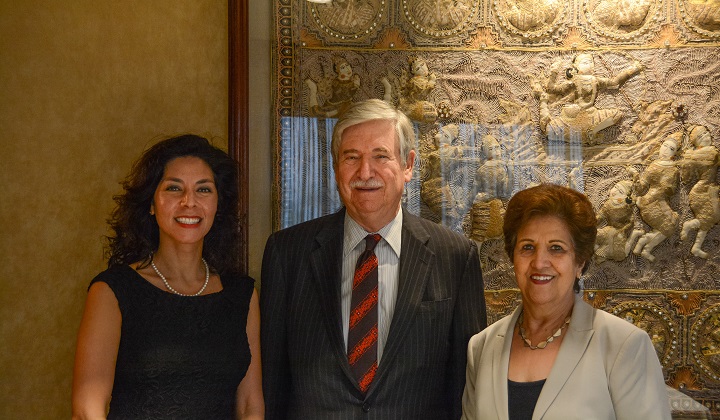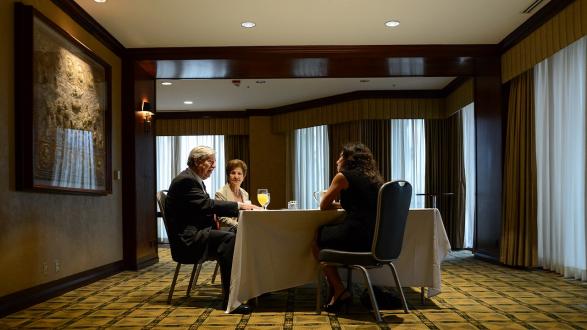From the Tehran Hostage Crisis to the Iranian Green Movement, the United States and Iran have had a tumultuous diplomatic relationship. As the watershed nuclear deal proceeds, how can each country better understand the other?
With over 30 years of experience in diplomacy and academia, Ambassador John Limbert is a leading expert on Iranian politics and history. He began his diplomatic career in Tehran and was one of 52 U.S. Embassy officials held hostage for 444 days from 1979-81. Ambassador Limbert most recently served as the first-ever Deputy Assistant Secretary of State for Iran in 2009.
At the fourth installment of the Edgerton Series on Iran and Turkey, Pacific Council member Ashley Tabaddor spoke with Ambassador Limbert and his wife, Mrs. Parvaneh Limbert – an artist and former diplomatic staff member at the U.S. State Department – about the various obstacles to improved U.S.-Iranian relations, women in Iran, as well as the landmark nuclear deal between the United States, Iran, and five other world powers. Ambassador Limbert weighed in on the global misperceptions of contemporary Iran and the paradox of U.S. interventionism.
The following transcript has been edited and condensed for clarity and length.
____________________
Ashley Tabaddor: What is the most pressing global issue that is not receiving enough attention?
Ambassador Limbert: Where to start? Too many people, with not enough food, not enough water, not enough healthcare. You see, all it takes is a couple of bad decisions, and four or five million people are on the move.
AT: Yes, what we are currently seeing is one of the biggest refugee crises in recent human history.
Amb. Limbert: It’s huge. It’s almost as big as after World War II, which people did handle – eventually – with a lot of trauma. The other thing we realize is how fragile structures, like the European community, are.
AT: Absolutely – even in spite of the rhetoric. When it gets real, you see what they’re really made of. It’s heartbreaking. So population explosion is what you see as our most pressing issue?
Amb. Limbert: Population explosion combined with instability, civil war, drought – it’s a very toxic cocktail. I’ve heard this expression in relation to many African countries. People used to say, “These countries are two bad decisions away from chaos and collapse.” Well, it isn’t just in Africa. It’s a much wider selection.
AT: There are so many misperceptions in the United States about Iran and the Iranian people. What would be the biggest misperception you would like to correct that would lead to a beneficial U.S.-Iran relationship?
Parvaneh Limbert: I think the best way is to have more films and movies focused on what is happening in Iran: the local population, restaurants, news, and houses. People don’t know what Iran looks like. I think this was one outcome of the revolution. They knew Iran very well before it. Iran has 2500 years of history. After the revolution, the name of Iran – especially after the hostage crisis – went down. People look at Iran as a backwards and closed country. The best way to correct this misperception is to show the real Iran through television and film.
AT: I think that binary point is very correct. People always ask me, “Do they have freeways in Iran?”
Amb. Limbert: I teach classes on Iran to undergraduates. On the first day of class, I show my students a 20-minute film called The Candidate from a young Iranian filmmaker. It’s about an older woman roaming the streets of Northern Tehran next to a girl’s college. She approaches these young women and asks if they’re interested in marrying her son. My students are just amazed by just about everything in the film, but particularly by the women and the reactions of the girls in the film. They see them covered in black school dress code. Their first reaction is that these people are backwards. When the girls start to talk, they’re very smart, savvy, and aware. My students say, “Wow, I never imagined that.” The two things really clash with each other. They don’t compute with each other. I say, “Welcome to the world of Iran.”
The beautiful thing is that the younger people are more open to this sort of thing. Their minds are open. So when they see things that are unexpected, they’ll accept it. Unlike some of the older folks who will simply reject it.
AT: Or maybe they think, “Oh, this is just an exception to the rule, or this is propaganda.” They don’t want to fully appreciate that this is a real representation of a significant part of the population.
I was surprised to hear from family and friends who go back and forth to Iran say, “You have no idea what Iran is really like.” You do not know until you see the films, the freeways, the buildings, industrialization. And when you see the women, you hear about how they make up more than 50% of the educated population.
Amb. Limbert: More than that. 65% in the universities!
AT: That in itself breaks misperception. They’re very active in spite of repression from the regime.
What do you think the international community can do to help with gender equality goals [in Iran] or advocate equal approach to gender by the government?
Amb. Limbert: Be very careful. No society appreciates foreigners preaching to it and telling it what to do, because they usually get it wrong. So in the first case, do no harm. Don’t preach; don’t scold. I mean you can say the facts. One of the most telling comments I ever saw was about sex change operations in Iran – Iranian transgender issues.
AT: That’s another misperception about Iran. It actually has the highest rate of [sex reassignment surgery].
Amb. Limbert: There is a documentary film, Be Like Others, about a young man who wants to have a sex change operation. His group of women friends says, “He must be crazy. Who in his right mind would choose to be a woman in this society?” He can wear what he wants, go where he wants, and talk to whom he wants to. Now he’s choosing to be a woman?
Parvaneh Limbert: The women are much stronger than the men. They work much harder, they’re more educated, well-spoken… more so than the men.
AT: In hindsight, what should the United States have done differently in response to the Green Revolution?
Amb. Limbert: This might not be popular to say, but I think we did the right thing by having a lighter touch. This was not our revolution. This was an Iranian movement. For the United States to get itself involved – it would’ve been a mistake for a couple reasons. For one, it would have identified the reformers as American agents, which would have fed the narrative of the most extreme group. Second, we probably would have gotten it wrong, because the U.S. record in terms of figuring out the different currents in Iranian politics is not good. Who are you going to support? Frankly, a lot of the currents in the Green Movement were questionable. You have to be careful and a little suspicious. For the United States to get involved in a political situation that it doesn’t understand very well is not a wise move. I know President Obama came under a lot of criticism for not supporting the Green Movement [in 2009], but I think he did the right thing.
AT: Engagement now seems to be the correct approach. What is the sweet spot in Iran-U.S. relations? Engaged enough to be effective, but not too engaged to be considered co-conspirators or meddling?
Amb. Limbert: I think [the sweet spot] is there, but I can’t find it. I remember a discussion with some young Iranians about supporting their movement. They said, “From you, we want hemoyat,” which means support. I said, “Fine, but you also say you don’t want dehollat,” which means interference. And they say, “Yes, we want hemoyat without dehollat.” It’s very tough.
AT: What do you think are going to be the unintended consequences of this nuclear deal?
Amb. Limbert: We don’t know. This is the interesting part of it: we’re on very unfamiliar ground. We’ve never been here before! For the last thirty or forty years, what have we and the Iranians done? We yelled at each other – if we communicated at all. We called each other names. It’s like we’re walking on ice – very thin ice. But one thing is pretty clear: I don’t like to generalize, but Iranians don’t like to be isolated. They see themselves as part of a larger world, and this goes back a long way. If we think about Iran’s interactions with the rest of the world, they’ve always done that.

AT: Because they think of themselves as players in the international community.
Amb. Limbert: Exactly. Most Iranians took their religion from outside; they took their script from outside. Much of their interaction has been with outsiders. You look at Iranian physical features, and you can see a lot of mixing with outsiders. Iran has never been isolated.
AT: And its people are very aware of what’s happening around the world.
Amb. Limbert: And this idea of [Iran] being like North Korea is repugnant to most people. There’s a real hunger for contact with the outside, of being with the outside. If the government is smart, it won’t try to isolate everybody, in my view.
AT: If you were asked to go back to the government to serve again, would you?
Amb. Limbert: No, no. I retired. I did 33 or 34 years in government service. I was proud of what I did; I loved what I did. After a certain time, age catches up with you. You leave it for the younger people.
I did go back for a year early in the Obama administration. But I hold an endowed chair at the U.S. Naval Academy. You don’t give those things up very easily. Back in 2009-2010, relations weren’t going anywhere.
AT: That’s what I read. I read you were frustrated with how everything was going with Iran.
Amb. Limbert: (Laughs) I was pretty hard to live with in those days.
____________________
Hon. Ashley Tabaddor is a member of the Pacific Council on International Policy.




